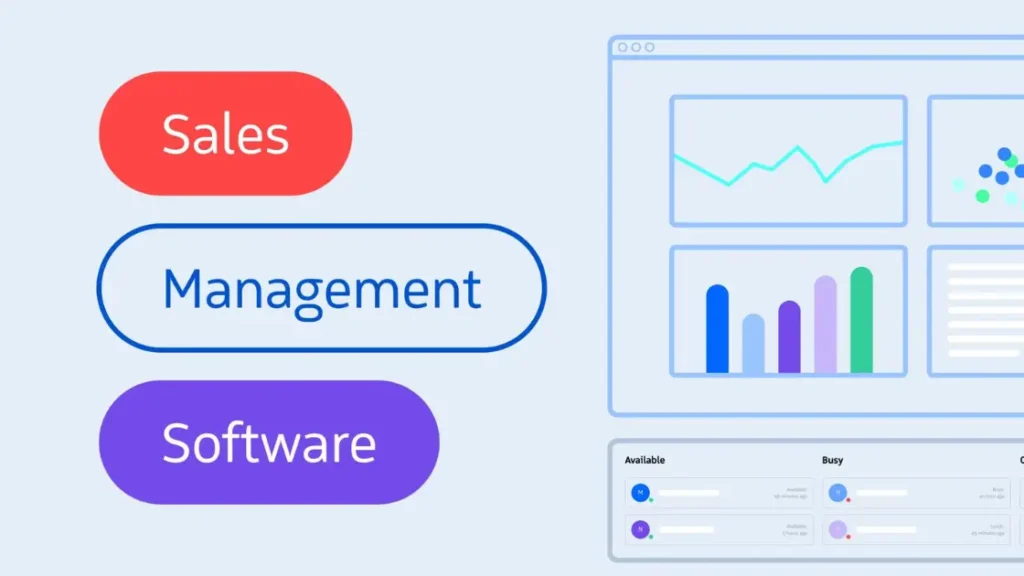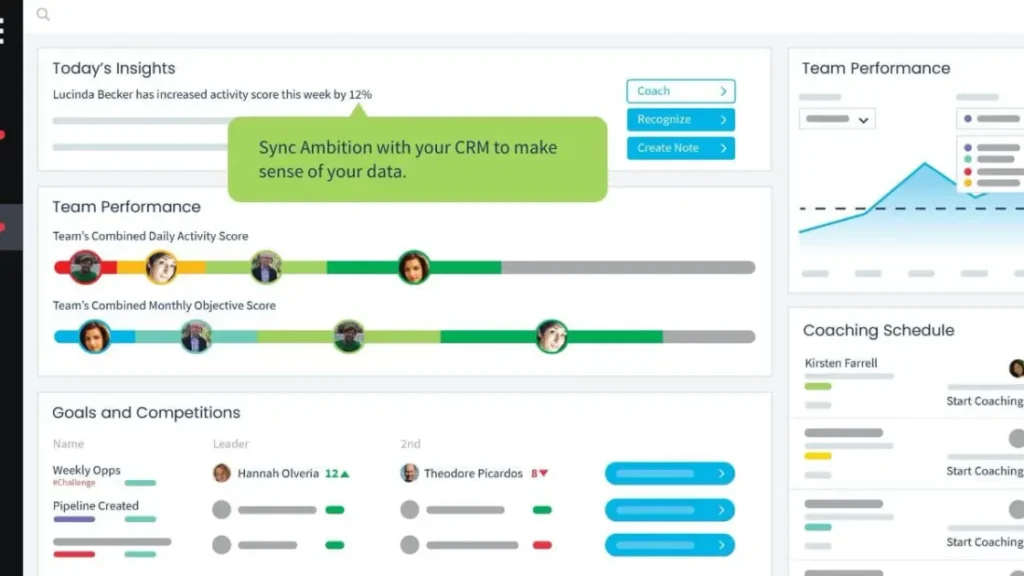Sales management software is a tool that helps businesses manage and streamline their sales processes. It includes features like lead tracking, analytics, and customer relationship management.
Sales management software enhances efficiency by automating routine tasks. It helps sales teams track leads, manage customer interactions, and analyze sales data. Businesses can customize the software to fit their specific needs, improving overall productivity. Sales managers can easily monitor performance and identify areas for improvement.
This software often integrates with other business tools, providing a comprehensive solution. By centralizing sales activities, it reduces the risk of errors and improves accuracy. Ultimately, sales management software supports better decision-making, leading to increased revenue and growth.
Table of Contents

Credit: www.revenue.io
Introduction To Sales Management Software
Sales Management Software streamlines your entire sales process. It helps businesses track, manage, and analyze their sales activities. This software boosts efficiency and drives growth.
Importance In Modern Sales
Modern sales teams rely heavily on technology. Sales Management Software provides real-time data. This data helps in making informed decisions.
It automates repetitive tasks. This frees up time for your sales team. They can focus on closing deals.
Using this software improves customer relationships. It tracks all interactions with potential clients. This ensures no detail is missed.
Key benefits include:
- Automated processes
- Enhanced customer insights
- Increased sales efficiency
- Improved communication within the team
Evolution Over Time
Sales Management Software has evolved significantly. Early systems were basic and manual. They required a lot of input from users.
In the early 2000s, cloud-based solutions emerged. These systems were more accessible and scalable. They allowed for real-time updates.
Today, AI and machine learning enhance these systems. They provide predictive analytics and personalized insights. This makes sales strategies more effective.
| Era | Key Features |
|---|---|
| Manual Systems | Basic tracking, high user input |
| Cloud-Based Solutions | Real-time updates, scalability |
| Modern AI-Driven | Predictive analytics, personalized insights |
Key Features
Sales Management software offers many features to boost sales efficiency. These features help in managing leads, forecasting sales, and much more. Let’s explore two key features in detail.
Lead Management
Effective lead management is crucial for any sales team. Sales Management software helps you track and organize potential customers. It ensures no lead is missed. Key aspects of lead management include:
- Lead Capture: Automatically capture leads from various sources.
- Lead Qualification: Categorize leads based on their potential.
- Lead Distribution: Assign leads to the right sales reps.
- Lead Nurturing: Engage leads with personalized communication.
Proper lead management boosts the chances of converting leads into customers. It ensures a streamlined sales process.
Sales Forecasting
Sales forecasting helps predict future sales performance. It is essential for planning and decision-making. Sales Management Software provides accurate forecasting tools. Key aspects of sales forecasting include:
- Historical Data Analysis: Analyze past sales data for trends.
- Pipeline Management: Monitor current deals in the sales pipeline.
- Predictive Analytics: Use algorithms to predict future sales.
- Reporting: Generate detailed forecast reports.
Accurate sales forecasting helps in setting realistic sales targets. It ensures better resource allocation and strategy planning.
Benefits for Businesses
Sales Management Software offers businesses numerous benefits. These tools help streamline operations, enhance customer relationships, and boost overall efficiency. Let’s explore the key advantages.
Efficiency Boost
Sales Management Software automates many repetitive tasks. This saves time and reduces human error. Employees can focus on more important activities.
- Automated data entry
- Real-time reporting
- Task scheduling
- Inventory tracking
These features ensure that the business runs smoothly. Managers can make quick decisions with accurate data.
Improved Customer Relationships
Sales Management Software helps businesses understand their customers better. It stores valuable customer information.
- Purchase history
- Contact details
- Feedback and complaints
Employees can access this information easily. This allows for personalized service. Customers feel valued and heard.
Sales Management Software also provides tools for better communication. Businesses can send targeted messages and offers. This strengthens the bond between the business and its customers.
Types of Sales Management Software
Sales Management software comes in various types. Each type serves different needs. Here, we discuss two main types: Cloud-Based Solutions and On-Premises Solutions.
Cloud-based Solutions
Cloud-based solutions are hosted on remote servers. Users can access them via the internet. This type offers several benefits:
- Flexibility: Access from anywhere, any device.
- Scalability: Easy to scale up or down.
- Cost-effective: Pay-as-you-go model.
Popular examples include Salesforce, HubSpot, and Zoho CRM.
On-premises Solutions
On-premises solutions are installed on local servers. They provide complete control over data. Key advantages include:
- Customization: Tailored to specific business needs.
- Security: Data stored within the company.
- Integration: Easily integrates with existing systems.
Notable examples are Microsoft Dynamics and SAP CRM.
| Type | Examples | Benefits |
|---|---|---|
| Cloud-Based | Salesforce, HubSpot, Zoho CRM | Flexibility, Scalability, Cost-effectiveness |
| On-Premises | Microsoft Dynamics, SAP CRM | Customization, Security, Integration |

Credit: www.close.com
Integration With Other Tools
Sales Management Software works well with other business tools. It streamlines processes and enhances productivity. Integration ensures data flows smoothly between systems.
CRM Systems
Customer Relationship Management (CRM) systems keep track of customer interactions. Integrating CRM systems with Sales Management software provides a unified view of customer data.
- Automates data entry
- Improves customer insights
- Enhances communication within teams
Integration ensures sales teams access updated customer details. It helps in personalizing sales strategies. This leads to better customer satisfaction and higher sales.
Marketing Automation
Marketing automation tools help in running marketing campaigns. Combining these tools with Sales Management software bridges the gap between sales and marketing teams.
- Aligns sales and marketing goals
- Tracks campaign performance
- Generates qualified leads
Integration allows sales teams to follow up on leads generated by marketing. It ensures a smooth transition from marketing to sales. This results in higher conversion rates.
| Tool | Benefit |
|---|---|
| CRM Systems | Unified customer data, improved insights |
| Marketing Automation | Aligned goals, higher conversion rates |
Choosing the Right Software
Choosing the right Sales Management software is a critical step for any business. It can streamline operations, boost productivity, and enhance customer relations. But how do you pick the right one? Let’s break it down into two main steps: Assessing Business Needs and Evaluating Features.
Assessing Business Needs
First, understand your business needs. Create a list of problems you aim to solve. Identify the goals you want to achieve with the software.
- Do you need to track customer interactions?
- Do you want to manage sales pipelines?
- Are you aiming to automate sales tasks?
Knowing your needs will help narrow down your options. This prevents you from getting overwhelmed by the myriad of choices available.
Evaluating Features
Next, evaluate the features of the software. Ensure they align with your business needs.
| Feature | Importance |
|---|---|
| Customer Relationship Management (CRM) | High |
| Sales Analytics | Medium |
| Automation Capabilities | High |
| Integrations | Medium |
Look for software that offers robust CRM capabilities. This helps in managing customer interactions effectively.
Check if the software provides detailed Sales analytics. This feature helps in making informed decisions based on data.
Automation capabilities are crucial for reducing manual tasks. This saves time and increases efficiency.
Ensure the software supports integrations with other tools you use. This ensures smooth workflows and data consistency.

Credit: spotio.com
Implementation Best Practices
Sales Management software can revolutionize your sales processes. Proper implementation is key to success. Following best practices ensures smooth integration and maximizes benefits. Let’s explore two essential best practices: Training Your Team and Ensuring Data Accuracy.
Training Your Team
Effective training is crucial for successful software implementation. A well-trained team uses the software efficiently, leading to better results.
- Start Early: Begin training before full implementation. This prepares the team.
- Use Various Methods: Combine live training, videos, and manuals.
- Role-Based Training: Tailor training to different roles. Sales reps and managers need different skills.
Regular refresher sessions help maintain skills. Encourage questions and feedback. This fosters continuous improvement.
Ensuring Data Accuracy
Accurate data is the backbone of effective sales management. Clean, precise data drives informed decisions.
- Initial Data Audit: Review existing data. Clean up duplicates and errors.
- Standardize Data Entry: Create clear guidelines. Ensure consistency in data input.
- Regular Updates: Schedule routine checks. Keep data current and relevant.
Implement data validation rules to minimize errors. Use automated tools for regular data cleaning. This ensures reliability and accuracy.
Future Trends
The future of Sales Management software is exciting. Technology is changing fast. New trends are emerging, making sales easier and smarter. Let’s explore two key trends shaping the future.
AI and Machine Learning
AI and machine learning are revolutionizing sales. They help in automating tasks. Sales teams can focus on important activities. AI can analyze customer data. It predicts buying behavior. This makes targeting more effective.
Machine learning offers personalized experiences. It understands customer preferences. This helps in crafting better sales strategies. AI-driven chatbots provide instant support. They answer queries quickly. This improves customer satisfaction.
Enhanced Analytics
Enhanced analytics is transforming sales management. It provides deeper insights. Sales managers can track performance better. They can identify trends and patterns. This helps in making informed decisions.
Analytics tools offer real-time data. Sales teams can respond quickly to changes. This improves agility. Predictive analytics is another key feature. It forecasts sales trends. This helps in planning future strategies.
Enhanced analytics tools are user-friendly. They present data visually. This makes it easy to understand. Sales teams can access these tools from anywhere. This ensures they stay informed always.
Case Studies
Case studies show how Sales Management software helps real companies. They offer practical insights and real-world examples. Read on to see stories of success from small businesses and large enterprises.
Small Business Success
Case Study: Ceros
Ceros, an interactive content design tool company, faced challenges with inefficient prospecting and low-quality leads. To address these issues, they implemented HubSpot’s Sales Hub, which allowed them to streamline their prospecting efforts and automate tasks. This solution led to a remarkable 180% increase in deal generation. By consolidating customer data and gaining deeper insights, Ceros could focus on higher-quality leads and personalize their sales interactions more effectively.
Key Features of Implementation:
- Data Consolidation: Unified customer information for better visibility.
- Task Automation: Reduced manual workload for the sales team.
- Customer Insights: Enhanced ability to identify cross-sell and upsell opportunities.
Enterprise-level Implementation
Case Study: ACI Corporation
ACI Corporation, a health insurance company with a large sales force, struggled with low conversion rates (approximately 5%). They adopted Salesken’s AI-driven real-time assistance integrated into their CRM. This technology transformed their sales process by converting speech to text and analyzing it to provide tailored solutions to customers. As a result, ACI saw significant improvements in both customer satisfaction and sales performance.
Results:
- Enhanced Lead Qualification: Improved understanding of customer needs.
- Higher Conversion Rates: More tailored offerings led to increased sales.
Case Study: Capgemini
Capgemini implemented Aptivio’s buyer intent AI platform to enhance its sales playbook across its numerous product lines. This integration allowed the firm to detect hidden revenue opportunities and prioritize leads based on online behavior throughout the sales funnel. The result was improved efficiency in identifying potential buyers and higher overall sales performance.
Key Outcomes:
- Improved Revenue Opportunities: Better identification of high-potential leads.
- Streamlined Sales Processes: Enhanced coordination across teams.
These case studies highlight the power of Sales Management software. Whether small or large, businesses benefit from streamlined processes and better data.
Conclusion
Sales management software streamlines your sales process, enhancing productivity and efficiency. It offers valuable insights and data-driven strategies. Implementing this software can lead to increased sales and better customer relationships. Investing in the right tool can transform your sales operations, driving growth and success in your business.







Leave a Comment